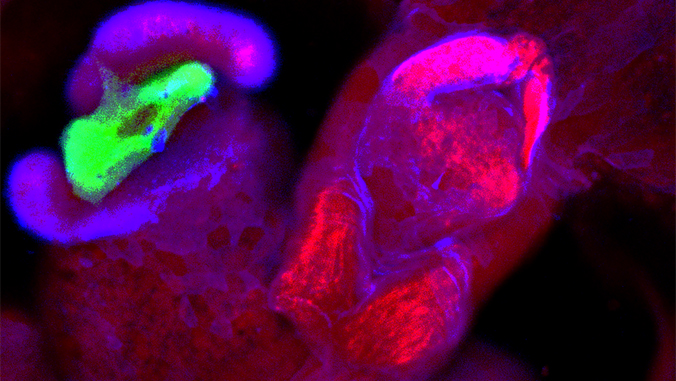
Margaret McFall-Ngai, professor and director of the Pacific Biosciences Research Center (PBRC) in the School of Ocean and Earth Science and Technology at the University of Hawaiʻi at Mānoa, has been selected to receive a MERIT award of more than $5 million from the National Institutes of Health (NIH).
MERIT or Method to Extend Research In Time awards have been offered since 1986 to “distinctly superior” investigators who have demonstrated high levels of competence and productivity in previous research efforts and “who are highly likely to continue to perform in an outstanding manner.” The awards, which can be extended for up to 10 years via a non-competitive renewal process after the first five years, are designed to give scientists long-term support, without the burden of constantly devoting time and staff resources to applying for new grants to fund their research.
UH News video: Native squid and its bacterium
may help human and environmental health
For nearly three decades, McFall-Ngai and PBRC Researcher Edward “Ned” Ruby have used the Hawaiian bobtail squid and its single bacterial symbiont, Vibrio fischeri, as a model biological system to characterize animal microbiomes. They have investigated the process by which an appropriate symbiont species is recruited into a host animal’s microbiome at the exclusion of all other bacteria, and discovered bacteria affecting animal development and bacterial partners driving circadian (daily) rhythms of their host.
“With this new award, Ned, who is the co-investigator on the grant, and I will continue to use marine animals to define the ‘rules’ that govern the molecular and biochemical ‘conversation’ that mediates the establishment and maintenance of an animal symbiosis with gram-negative bacteria (a classification of bacteria that can cause many types of infections),” said McFall-Ngai.
Award-winning investigation of bacteria

Humans, as with all other animals, have many symbiotic, or friendly, bacteria living inside and on our bodies. These associations typically involve trillions of bacteria.
“Deciphering the molecular language between the host-symbiont partners is very challenging,” said McFall-Ngai. “The marine animal with which we work has a binary association, that is, one bacterial species living with a single host animal. As such, it’s like dropping into a conversation with two people, rather than dropping into a celebration that has millions of people.”
Since bacteria have been driving animal biology since the origin of animals, it is not surprising that the basis of interactions of animals with bacteria is conserved across the evolutionary trajectory of animals, making this research relevant to human biology, as well.
McFall-Ngai and Ruby were the first to show that bacteria can drive animal development and they do so by signaling with their surface molecules. A few years later mammalian biologists built on this finding to determine that gram-negative bacteria drive maturation of the gut-associated lymphoid tissue, using the exact same bacterial molecules.
“Our goal is to define the basic cell, biochemical and molecular underpinnings and provide insights for human biologists,” said McFall-Ngai.

More on MERIT awards
MERIT awardees are nominated by the funding NIH institute from a large pool of competing award recipients and then endorsed by an institutes’ advisory council. Less than 5 percent of NIH-funded investigators are selected to receive MERIT awards.
- More about McFall-Ngai: Microbiology expert wins $1M, plans to transform biology education,
December 13, 2017 - UH’s only female NAS member reveals how animals select good microbes, August 28, 2017
- Native squid and its bacterium may help human and environmental health, February 5, 2017
“This prestigious MERIT award is NIH‘s acknowledgement of research excellence being sustained by Margaret and Ned over the years. It is one of the highest forms of recognition by a federal funding agency,” said School of Ocean and Earth Science and Technology Dean Brian Taylor.
“There is something wonderful about not having to stress over a renewal in 5 years,” said McFall-Ngai. “As long as we are as productive as we have been, the grant will continue without having to submit a competitive renewal. We have been contributing all of our careers to this area and we are gratified that NIH has recognized our work in this way.”
McFall-Ngai’s award will run until January 31, 2028.
—By Marcie Grabowski

